How To Tell If Someone Is Polyamorous
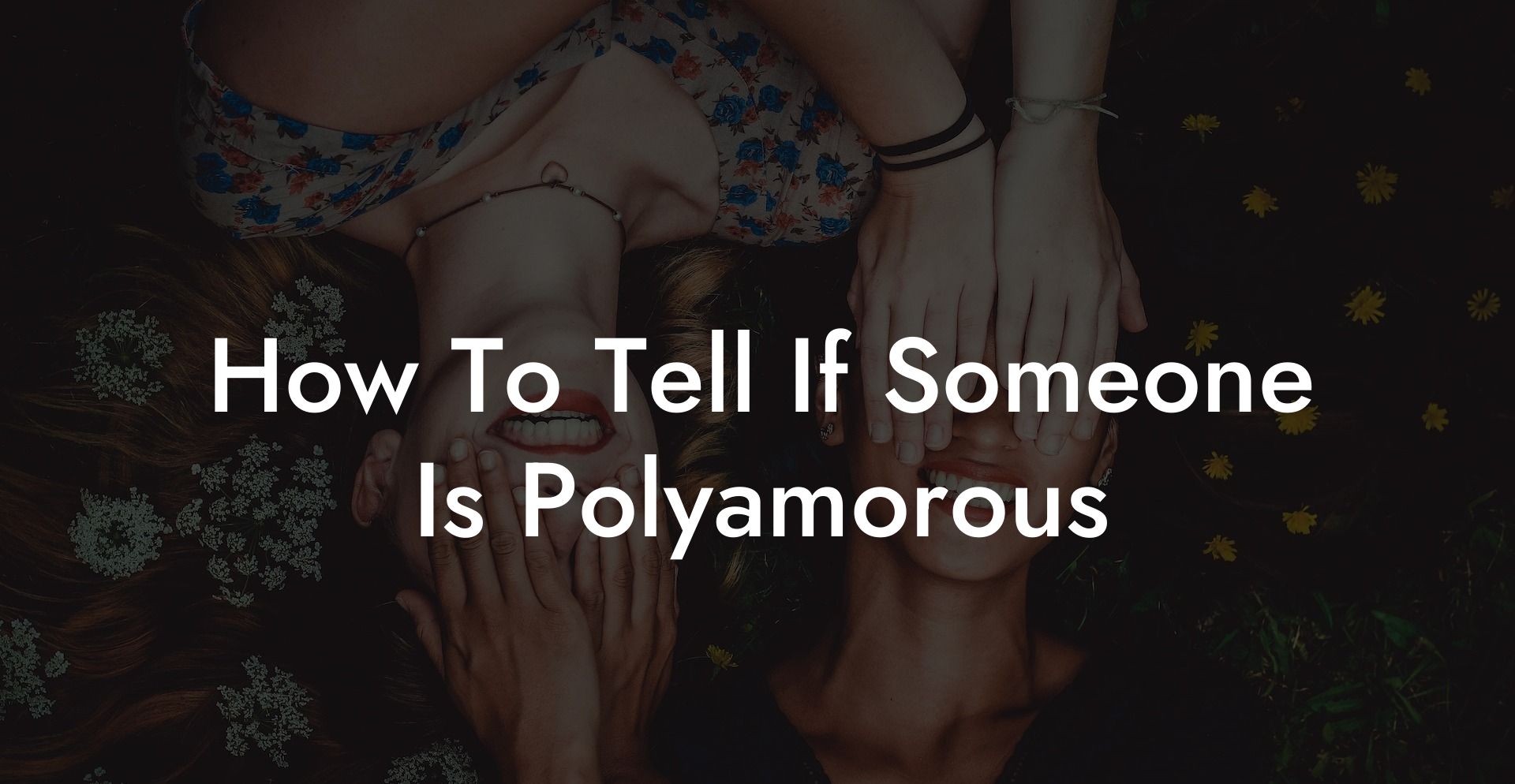
Have you ever wondered how to tell if someone is polyamorous? In a world where relationship models are more diverse than ever, understanding the signs of polyamory can help you connect with others and foster open, honest conversations about love. This comprehensive guide explores the subtle and obvious indicators that someone might be polyamorous. We’ll dive into behavioral clues, communication cues, social media signals, and personal values, all wrapped up in a friendly, relatable tone that makes the subject accessible. Whether you’re new to the concept or have been curious for a while, read on to discover how to tell if someone is polyamorous and why understanding this can enrich your relationships.
Quick Links to Useful Sections
- Understanding the Concept of Polyamory
- Common Behavioral and Lifestyle Indicators
- Communication Cues and Language Patterns
- Social Media and Online Indicators
- How to Initiate Conversations About Polyamory
- Addressing Common Misconceptions About Polyamory
- The Benefits and Challenges of Polyamory
- FAQ: How to Tell if Someone Is Polyamorous
- Resources and Community Support
Understanding the Concept of Polyamory
Polyamory is the practice of engaging in multiple romantic or sexual relationships simultaneously, with the full knowledge and consent of everyone involved. It is built on the foundations of ethical non-monogamy, which emphasize open communication, informed consent, and mutual respect. Unlike cheating or secret affairs, polyamory is transparent and intentional. People who identify as polyamorous often believe that love is abundant and that a person can form deep, meaningful connections with more than one individual at a time.
Importantly, polyamory is not a one-size-fits-all label. For some, it means having a primary partner along with secondary or tertiary connections; for others, all relationships are considered equal. The key elements that unite polyamorous relationships include the willingness to negotiate boundaries, the capacity for self-reflection, and the commitment to honest, ongoing dialogue. Understanding these core principles can help you recognize the signs of polyamory in others.
Common Behavioral and Lifestyle Indicators
There are several observable cues that may suggest someone is polyamorous. While no single indicator is conclusive on its own, a combination of behaviors and lifestyle choices can offer strong hints. Here are some common signs:
- Open Discussion of Multiple Relationships: Polyamorous individuals often mention their partners or discuss their relationship dynamics openly. They might casually reference “my partners” or talk about spending time with multiple significant others without seeming secretive.
- Flexible Relationship Terminology: Instead of using terms like “boyfriend” or “girlfriend” exclusively, they might use broader language such as “partner,” “significant other,” or simply refer to relationships without labeling them in the traditional sense.
- Involvement in Non-Monogamy Communities: Engagement in online forums, social media groups, or local meet-ups dedicated to polyamory can be a strong indicator. Look for participation in events or discussions that focus on ethical non-monogamy.
- Books, Podcasts, and Media Interests: If you notice someone frequently references books like "The Ethical Slut" or listens to podcasts such as “Multiamory,” this might signal an interest in or practice of polyamory.
- Emphasis on Communication and boundaries: Polyamorous individuals often highlight the importance of honesty and clear boundaries in their conversations. They may stress how essential it is to have “check-ins” or to negotiate what each relationship entails.
These behavioral cues, when observed together, can provide valuable insight into whether someone practices polyamory. However, remember that these are general tendencies and not definitive proof.
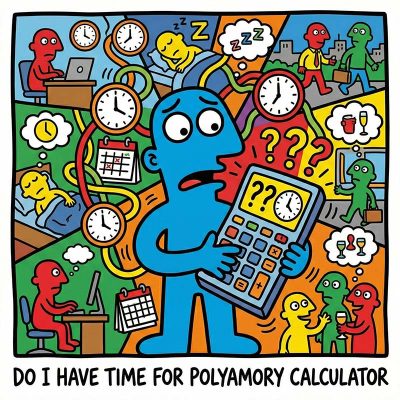
Love is infinite, but your calendar is brutally finite. The fantasy is deep connection; the reality is often just exhausted "calendar tetris." Promising time you don't actually have isn't romantic, it’s a recipe for burnout and broken trust. That sinking feeling when you have to cancel again? That’s the sound of overextension destroying your relationships.
This calculator forces you to confront the math of your life. Do you actually have space for another heart, or are you just setting everyone up for disappointment?
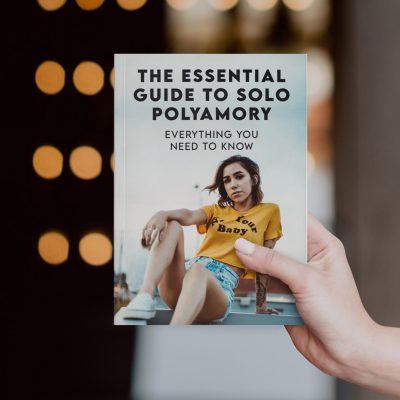
The fantasy is total autonomy and connection. The reality? It can feel like drowning in scheduling chaos and misunderstood expectations. That anxiety you feel isn’t just stress; it’s the wobble of living without a default "anchor." Without a solid architecture, Solo Polyamory stops being a life design and starts being a recipe for burnout and confusion.
The Essential Guide replaces the drift with a concrete anchor. We provide the "Solo Ethic," boundary scripts, and burnout protocols needed to protect your peace. Don't just date around—build a life that actually works for you.
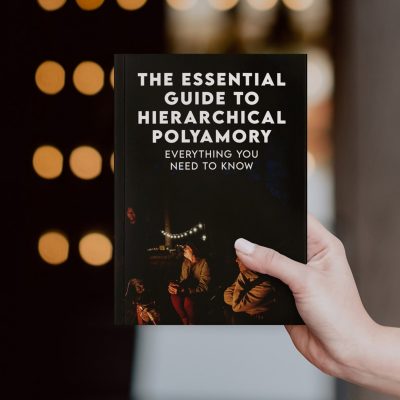
Hierarchy sounds like a corporate org chart until someone gets their feelings hurt. That stomach-turning fear that you are just a "secondary" who can be fired at any time is real. If your relationship feels like a secret ranking system, you are doing it wrong.
Ambiguity is where resentment grows. The Essential Guide replaces the "who matters more" panic with a concrete charter. We provide the scripts and equity guardrails needed to protect every heart in the polycule. Stop guessing and start building.
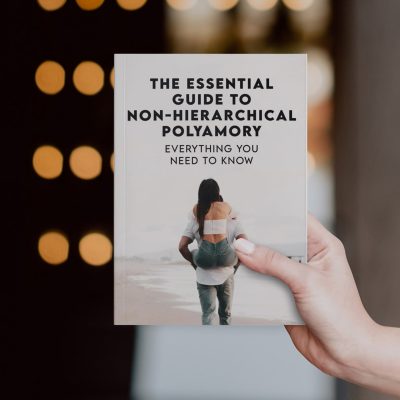
The ideal is pure equality. The reality? It often slides into hidden rankings where someone gets hurt. That sinking feeling that you are secretly a "secondary" despite the label? That is your intuition detecting couple privilege. Ambiguity is where resentment thrives.
The Essential Guide replaces vague promises with concrete governance. We provide the charters, equity tools, and jealousy protocols needed to ensure "non-hierarchical" isn't just a fantasy. Stop guessing who matters most. Build a network that is actually fair.

The fantasy is total autonomy and connection. The reality? It can feel like drowning in scheduling chaos and misunderstood expectations. That anxiety you feel isn’t just stress; it’s the wobble of living without a default "anchor." Without a solid architecture, Solo Polyamory stops being a life design and starts being a recipe for burnout and confusion.
The Essential Guide replaces the drift with a concrete anchor. We provide the "Solo Ethic," boundary scripts, and burnout protocols needed to protect your peace. Don't just date around—build a life that actually works for you.

Hierarchy sounds like a corporate org chart until someone gets their feelings hurt. That stomach-turning fear that you are just a "secondary" who can be fired at any time is real. If your relationship feels like a secret ranking system, you are doing it wrong.
Ambiguity is where resentment grows. The Essential Guide replaces the "who matters more" panic with a concrete charter. We provide the scripts and equity guardrails needed to protect every heart in the polycule. Stop guessing and start building.
Communication Cues and Language Patterns
The way a person talks about their relationships can also be very telling. Polyamorous individuals usually use inclusive language that acknowledges multiple partners. Here are some language patterns to look for:
- Inclusive Pronouns and Terms: Phrases like “we are all in this together” or referring to “our family” can indicate a polyamorous network.
- Sharing Relationship Stories: They might casually mention fun or meaningful experiences with more than one partner during conversations. For example, “Last weekend, I had an amazing dinner with one partner and then went hiking with another” is a subtle but clear indicator.
- Discussing Boundaries and Check-Ins: Expect to hear about regular discussions concerning relationship boundaries, scheduling, and the importance of communication. Terms like “I had a check-in with my partner” or “we negotiated a new boundary” are common.
These communication cues can help you understand how a person structures their emotional world and whether they see love as a flexible, expansive resource.
Social Media and Online Indicators
In today’s digital age, social media profiles and online behavior can offer clues about someone’s relationship style. Here’s what to look for:
- Profile Descriptions: Some individuals explicitly mention “polyamorous” in their bios on dating apps or social media platforms. Others might list multiple partners or reference non-monogamous lifestyles.
- Posts and Group Memberships: Look for posts about polyamory, ethical non-monogamy, or related events. Membership in online groups dedicated to polyamory (such as specific Reddit communities or Facebook groups) is a strong indicator.
- Sharing Experiences: Frequent sharing of articles, quotes, or personal reflections about the benefits and challenges of non-monogamy can be a sign of polyamorous practice.
While these online signals are not foolproof, they can serve as additional context when trying to understand someone’s relationship preferences.
How to Initiate Conversations About Polyamory
If you’re curious about whether someone is polyamorous, starting a respectful conversation can be a great way to learn more. Here are some tips:
- Be Respectful and Open-Minded: Approach the conversation without judgment. Express genuine curiosity rather than skepticism.
- Share Your Own Perspective: Sometimes, sharing your own experiences with relationships can encourage others to open up. For example, “I’ve been reading a lot about different relationship styles, and I’m curious how others experience love” can be an inviting opener.
- Ask Open-Ended Questions: Instead of asking “Are you polyamorous?” try questions like “How do you view romantic relationships?” or “What does love mean to you?”
- Listen Actively: When they share, listen carefully and avoid interrupting. Ask follow-up questions to show you’re engaged and interested.
This approach not only helps you learn more about the person’s relationship style but also fosters a deeper, more empathetic dialogue about love in all its forms.
Addressing Common Misconceptions About Polyamory
Many people hold misconceptions about polyamory, often equating it with promiscuity or a lack of commitment. Here’s how you can explain it clearly:
- Polyamory Is Not Promiscuity: Emphasize that polyamory is about consensual, ethical non-monogamy where all partners are aware and involved in the relationship dynamics.
- Commitment Still Matters: Explain that many polyamorous individuals are deeply committed to their partners. The commitment is not diminished by having multiple relationships, it is simply distributed among them.
- It's About Quality, Not Quantity: Polyamory is focused on cultivating meaningful connections rather than accumulating a high number of casual encounters.
- It Requires Excellent Communication: Highlight that polyamorous relationships often involve more structured and frequent communication than monogamous ones, ensuring that everyone’s needs are met.
By addressing these misconceptions directly, you can help monogamous individuals better understand the values and intentions that underpin polyamory.
The Benefits and Challenges of Polyamory
Explaining the benefits and challenges of polyamory can provide a balanced perspective. Here are some key points:
- Benefits:
- Diverse Emotional Support: Different partners can provide various types of support, fulfilling a broader range of emotional needs.
- Personal Growth: Managing multiple relationships often leads to increased self-awareness, improved communication skills, and a better understanding of one’s desires.
- Flexibility: Polyamory allows individuals to tailor their relationship networks to suit their evolving lifestyles and needs.
- Enhanced Creativity: Exposure to multiple perspectives can inspire creativity and new ways of thinking about love and connection.
- Challenges:
- Emotional Complexity: Balancing feelings among multiple partners can be challenging and may require ongoing self-reflection.
- Time Management: Juggling several relationships demands effective scheduling and prioritization.
- Potential Jealousy: Even with open communication, feelings of jealousy can arise and must be managed thoughtfully.
- Social Stigma: Polyamory is still not widely understood, which can sometimes lead to misunderstanding or judgment from others.
Understanding these benefits and challenges can help create a more nuanced conversation and demonstrate that polyamory, like any relationship model, has its complexities and rewards.
FAQ: How to Tell if Someone Is Polyamorous
1. What is polyamory?
Polyamory is the practice of engaging in multiple consensual romantic or sexual relationships simultaneously, built on open communication and mutual respect.
2. What behavioral cues might indicate someone is polyamorous?
They may openly discuss having multiple partners, use inclusive relationship terminology, participate in polyamory communities online, and reference polyamorous literature or podcasts in their conversations.
3. How can I tell from someone’s communication style if they are polyamorous?
Polyamorous individuals often emphasize the importance of regular check-ins, clear negotiation of boundaries, and open discussions about emotions and relationship dynamics. They may use “I” statements and share experiences that involve more than one partner.
4. Are there social media indicators of polyamory?
Yes, many polyamorous people mention their lifestyle in their online profiles, share content related to polyamory, and participate in communities or groups dedicated to ethical non-monogamy.
5. Can polyamorous people have deep, committed relationships?
Absolutely. Many polyamorous individuals are in deeply committed primary relationships, while also maintaining additional consensual connections.
6. Is polyamory the same as promiscuity?
No. Polyamory is based on ethical non-monogamy, which emphasizes informed consent, transparency, and respect. It is distinct from promiscuity, which often involves casual, non-consensual behavior.
7. How important is communication for someone who is polyamorous?
Communication is essential. Open dialogue about feelings, boundaries, and expectations is a cornerstone of polyamorous relationships.
8. What should I do if I suspect someone is polyamorous?
Approach the topic with sensitivity and respect. Engage in open-ended conversations about relationship values without making assumptions or judgments.
9. How can I learn more about polyamory?
Resources such as books like "The Ethical Slut" and "More Than Two", podcasts like “Multiamory,” and online communities on Reddit and Facebook are great places to start.
10. Can someone’s relationship style change over time?
Yes, many people find that their views on relationships evolve as they grow and experience different dynamics. It’s normal for someone to explore various forms of connection throughout their life.
Resources and Community Support
- Books: "The Ethical Slut" by Dossie Easton & Janet Hardy and "More Than Two" by Franklin Veaux & Eve Rickert offer deep insights into polyamory.
- Podcasts: "Multiamory" and similar shows provide personal stories and expert advice on ethical non-monogamy.
- Online Communities: Engage with Reddit communities like r/polyamory or dedicated Facebook groups for support and shared experiences.
- Therapy and Counseling: Consider consulting a therapist who specializes in relationship dynamics and non-monogamy to help you navigate your feelings and questions.
With thoughtful self-reflection, open dialogue, and the support of a vibrant community, you can confidently understand and explain polyamory, bridging the gap between diverse relationship models.

Love is infinite, but your calendar is brutally finite. The fantasy is deep connection; the reality is often just exhausted "calendar tetris." Promising time you don't actually have isn't romantic, it’s a recipe for burnout and broken trust. That sinking feeling when you have to cancel again? That’s the sound of overextension destroying your relationships.
This calculator forces you to confront the math of your life. Do you actually have space for another heart, or are you just setting everyone up for disappointment?

The fantasy is total autonomy and connection. The reality? It can feel like drowning in scheduling chaos and misunderstood expectations. That anxiety you feel isn’t just stress; it’s the wobble of living without a default "anchor." Without a solid architecture, Solo Polyamory stops being a life design and starts being a recipe for burnout and confusion.
The Essential Guide replaces the drift with a concrete anchor. We provide the "Solo Ethic," boundary scripts, and burnout protocols needed to protect your peace. Don't just date around—build a life that actually works for you.

Hierarchy sounds like a corporate org chart until someone gets their feelings hurt. That stomach-turning fear that you are just a "secondary" who can be fired at any time is real. If your relationship feels like a secret ranking system, you are doing it wrong.
Ambiguity is where resentment grows. The Essential Guide replaces the "who matters more" panic with a concrete charter. We provide the scripts and equity guardrails needed to protect every heart in the polycule. Stop guessing and start building.

The ideal is pure equality. The reality? It often slides into hidden rankings where someone gets hurt. That sinking feeling that you are secretly a "secondary" despite the label? That is your intuition detecting couple privilege. Ambiguity is where resentment thrives.
The Essential Guide replaces vague promises with concrete governance. We provide the charters, equity tools, and jealousy protocols needed to ensure "non-hierarchical" isn't just a fantasy. Stop guessing who matters most. Build a network that is actually fair.

The fantasy is total autonomy and connection. The reality? It can feel like drowning in scheduling chaos and misunderstood expectations. That anxiety you feel isn’t just stress; it’s the wobble of living without a default "anchor." Without a solid architecture, Solo Polyamory stops being a life design and starts being a recipe for burnout and confusion.
The Essential Guide replaces the drift with a concrete anchor. We provide the "Solo Ethic," boundary scripts, and burnout protocols needed to protect your peace. Don't just date around—build a life that actually works for you.

Hierarchy sounds like a corporate org chart until someone gets their feelings hurt. That stomach-turning fear that you are just a "secondary" who can be fired at any time is real. If your relationship feels like a secret ranking system, you are doing it wrong.
Ambiguity is where resentment grows. The Essential Guide replaces the "who matters more" panic with a concrete charter. We provide the scripts and equity guardrails needed to protect every heart in the polycule. Stop guessing and start building.
Aging And Long Term Care Planning As Solo Poly
Attachment Styles And Solo Polyamory
Autonomy And Self Partnership As Foundations
Avoiding Avoidance Disguised As Autonomy
Avoiding Being Treated As An Accessory Relationship
Balancing Independence And Intimacy
Balancing Multiple Partners Without Burnout
Barrier Use Conversations With Multiple Partners
Boundaries Versus Rules In Solo Poly Relationships
Breakups And Grief While Staying Solo
Building Emotional Availability As Solo Poly
Caregiving And Illness Support Without A Nesting Partner
Co Parenting Agreements And Boundaries
Co Parenting And Family Building As Solo Poly
Coming Out As Solo Polyamorous
Common Mistakes Partners Make With Solo Poly People
Common Mistakes Solo Poly People Make
Common Myths About Solo Polyamory
Communication Check Ins That Fit Solo Poly
Community And Chosen Family For Solo Poly People
Compersion And Neutrality Toward Partner Dating
Conflict Resolution Without Couple Default
Core Values Of Solo Polyamory
Creating Agreements That Preserve Independence
Creating Secure Attachment Without Traditional Milestones
Dating People Who Want Escalation
De Escalation As A Healthy Choice
Decentering Couple Norms And Escalator Scripts
Deciding Whether Solo Polyamory Is Right For You
Defining Relationship Depth Without Shared Living
Defining Success Without Traditional Milestones
Designing A Sustainable Solo Poly Life
Digital Safety And Privacy
Disability And Access Needs As Solo Poly
Emergency Contacts And Support Planning
End Of Life Planning And Legal Documents
Energy Management And Overextension Risks
Financial Independence And Entanglement Decisions
Finding Solo Poly Friendly Community
Friendships As Core Support Structures
Gifts Trips And Resource Boundaries
Handling Being The Newest Partner
Handling Judgment From Monogamous Culture
Handling Judgment From Poly Communities
Handling Last Minute Plan Changes
Holidays And Special Occasions As Solo Poly
Housing Choices And Living Alone
How To Disclose Solo Polyamory Early While Dating
How To Explain Solo Polyamory To Partners
In Person Events And Support Networks
Intersectionality In Solo Poly Experiences
Long Distance Relationships And Solo Poly
Maintaining Rituals Without Domestic Integration
Maintaining Self Partnership Through Loss
Managing Insecurity Without Default Reassurance
Managing Metamour Dynamics Without Centering A Couple
Managing Nre Without Losing Yourself
Navigating Jealousy As A Solo Poly Person
Navigating Marriage Offers As Solo Poly
Navigating Partners With Nesting Or Spouses
Pacing New Connections Ethically
Parallel Versus Kitchen Table Preferences
Parenting Without A Primary Partner Model
Pregnancy And Fertility Conversations For Solo Poly
Privacy And Information Sharing Consent
Processing Loneliness While Staying Solo
Protecting Personal Time Without Withholding Connection
Quality Time When You Do Not Share A Home
Race Gender And Class Factors In Solo Poly
Religion Culture And Family Expectations
Relocation And Maintaining Connections
Repair After Misunderstandings With Partners
Responding To Requests For Primary Status
Risk Profiles And Informed Consent
Screening For People Who Respect Autonomy
Self Worth Outside Relationship Status
Setting Expectations With Highly Partnered People
Sexual Health Agreements As A Solo Poly Person
Shared Housing With Friends And Community
Signs Solo Polyamory Is Working Well
Social Media Boundaries And Visibility
Solo Polyamory And Career Mobility
Solo Polyamory And Commitment
Solo Polyamory And Mental Health Support
Solo Polyamory And Metamour Relationships
Solo Polyamory Versus Being Single
Solo Polyamory Versus Non Hierarchical Polyamory
Solo Polyamory Versus Relationship Anarchy
Substance Use Boundaries And Consent
Testing Schedules And Disclosure Practices
The History And Evolution Of Solo Polyamory
Therapy And Coaching For Solo Polyamory
Time And Scheduling As A Solo Poly Person
Transparency Without Being Managed
Travel And Overnights Without Implied Escalation
Warning Signs Of Isolation Masquerading As Autonomy
What Commitment Looks Like Without Nesting
What Solo Polyamory Is And What It Is Not
Why People Choose Solo Polyamory
Writing A Solo Poly Dating Profile
Accountability When Harm Occurs
Aging And Long Term Planning
Alternatives To Veto Policies
Attachment Styles And Hierarchy
Avoiding Disposable Partner Dynamics
Avoiding Entitlement In Primary Relationships
Avoiding Objectification And Ranking Language
Blended Families And Co Parenting Dynamics
Boundaries Versus Rules In Hierarchical Contexts
Caregiving And Illness Decisions
Choosing Hierarchy Intentionally
Common Challenges Faced By Secondary Partners
Common Mistakes Primary Partners Make
Common Mistakes Secondary Partners Make
Common Myths About Hierarchical Polyamory
Communicating Limits Without Devaluing Others
Community Perception Of Hierarchical Polyamory
Compersion When Time And Resources Are Unequal
Consent And Transparency In Hierarchy
Consent Under Unequal Power Dynamics
Cultural And Socioeconomic Influences On Hierarchy
De Escalation Without Punishment
Deciding Whether Hierarchical Polyamory Is Right For You
Decision Making Power In Primary Relationships
Descriptive Versus Prescriptive Hierarchy
Emotional Labor Distribution Across Partners
Emotional Regulation Skills For Hierarchical Dynamics
Emotional Safety For Non Primary Partners
Ending Relationships Ethically Within Hierarchy
Ethical Foundations Of Hierarchical Structures
Ethical Storytelling About Hierarchical Relationships
Ethical Use Of Veto Power
Fear Of Replacement Or Demotion
Financial Transparency With Multiple Partners
Handling Breakups Within A Hierarchical System
Hierarchy Versus Relationship Anarchy
Holidays Vacations And Special Occasions
How Hierarchical Polyamory Differs From Non Hierarchical Polyamory
How Hierarchical Polyamory Evolves Over Time
How Privilege Shows Up In Daily Decisions
How To Disclose Hierarchy Early In Dating
Inclusion Versus Exclusion Practices
Integrating Hierarchy With Personal Values
Integrating New Partners Ethically
Intersectionality And Power In Hierarchy
Jealousy In Hierarchical Polyamory
Legal Risks And Protections
Lessons Hierarchical Polyamory Teaches About Love
Letting Go Of Hierarchy When It No Longer Fits
Living Together Versus Living Apart
Long Distance Relationships Within Hierarchy
Managing Boundary Violations
Managing Comparison Between Partners
Marriage And Legal Privilege In Hierarchical Polyamory
Measuring Fulfillment Beyond Priority Status
Navigating Attachment As A Secondary Partner
Navigating Conflicts Between Partners At Different Levels
Navigating Judgment From Non Hierarchical Communities
Ongoing Check Ins Across Relationship Levels
Opening Or Closing The Hierarchy
Parenting And Family Planning Within Hierarchy
Power Imbalances Inherent In Hierarchy
Pregnancy And Parenting Transitions
Primary Secondary And Tertiary Relationship Definitions
Privacy And Information Flow
Re Negotiating Hierarchy After Major Life Events
Rebuilding Trust After Structural Changes
Renegotiating Primary Agreements Over Time
Repair Conversations After Hierarchical Tension
Repairing Harm Caused By Hierarchical Decisions
Resentment And Unspoken Grief
Responsibilities And Expectations Of Primary Partners
Rules That Protect Versus Rules That Control
Scheduling Fairness Versus Equality
Self Worth Outside Relationship Rank
Setting Clear Expectations With New Partners
Shared Finances And Resource Prioritization
Signs Hierarchy Is Functioning Well
Supporting Mental Health Across The Network
Supporting Secondary Partners Through Transitions
The Origins And History Of Hierarchical Polyamory
The Role Of Nesting Partners
Therapy And Coaching For Hierarchical Polyamory
Time Allocation And Scheduling Priorities
Transparency Without Oversharing
Treating All Partners As Whole People
Understanding Couple Privilege
Warning Signs Of Unhealthy Hierarchy
What Hierarchical Polyamory Is And What It Is Not
What It Means To Be A Primary Partner
What It Means To Be A Secondary Partner
What People Wish They Knew Earlier
What Success Looks Like In Hierarchical Polyamory
When Hierarchy Activates Past Trauma
When Hierarchy Becomes Coercive
When Hierarchy Emerges Without Intention
When Primary Relationships Change
When Professional Support Is Needed
When Secondary Relationships Deepen
Why Hierarchy Exists In Some Polyamorous Relationships
Accountability When Harm Occurs
Aging And Long Term Planning
Alternatives To Veto Policies
Attachment Styles And Hierarchy
Avoiding Disposable Partner Dynamics
Avoiding Entitlement In Primary Relationships
Avoiding Objectification And Ranking Language
Blended Families And Co Parenting Dynamics
Boundaries Versus Rules In Hierarchical Contexts
Caregiving And Illness Decisions
Choosing Hierarchy Intentionally
Common Challenges Faced By Secondary Partners
Common Mistakes Primary Partners Make
Common Mistakes Secondary Partners Make
Common Myths About Hierarchical Polyamory
Communicating Limits Without Devaluing Others
Community Perception Of Hierarchical Polyamory
Compersion When Time And Resources Are Unequal
Consent And Transparency In Hierarchy
Consent Under Unequal Power Dynamics
Cultural And Socioeconomic Influences On Hierarchy
De Escalation Without Punishment
Deciding Whether Hierarchical Polyamory Is Right For You
Decision Making Power In Primary Relationships
Descriptive Versus Prescriptive Hierarchy
Emotional Labor Distribution Across Partners
Emotional Regulation Skills For Hierarchical Dynamics
Emotional Safety For Non Primary Partners
Ending Relationships Ethically Within Hierarchy
Ethical Foundations Of Hierarchical Structures
Ethical Storytelling About Hierarchical Relationships
Ethical Use Of Veto Power
Fear Of Replacement Or Demotion
Financial Transparency With Multiple Partners
Handling Breakups Within A Hierarchical System
Hierarchy Versus Relationship Anarchy
Holidays Vacations And Special Occasions
How Hierarchical Polyamory Differs From Non Hierarchical Polyamory
How Hierarchical Polyamory Evolves Over Time
How Privilege Shows Up In Daily Decisions
How To Disclose Hierarchy Early In Dating
Inclusion Versus Exclusion Practices
Integrating Hierarchy With Personal Values
Integrating New Partners Ethically
Intersectionality And Power In Hierarchy
Jealousy In Hierarchical Polyamory
Legal Risks And Protections
Lessons Hierarchical Polyamory Teaches About Love
Letting Go Of Hierarchy When It No Longer Fits
Living Together Versus Living Apart
Long Distance Relationships Within Hierarchy
Managing Boundary Violations
Managing Comparison Between Partners
Marriage And Legal Privilege In Hierarchical Polyamory
Measuring Fulfillment Beyond Priority Status
Navigating Attachment As A Secondary Partner
Navigating Conflicts Between Partners At Different Levels
Navigating Judgment From Non Hierarchical Communities
Ongoing Check Ins Across Relationship Levels
Opening Or Closing The Hierarchy
Parenting And Family Planning Within Hierarchy
Power Imbalances Inherent In Hierarchy
Pregnancy And Parenting Transitions
Primary Secondary And Tertiary Relationship Definitions
Privacy And Information Flow
Re Negotiating Hierarchy After Major Life Events
Rebuilding Trust After Structural Changes
Renegotiating Primary Agreements Over Time
Repair Conversations After Hierarchical Tension
Repairing Harm Caused By Hierarchical Decisions
Resentment And Unspoken Grief
Responsibilities And Expectations Of Primary Partners
Rules That Protect Versus Rules That Control
Scheduling Fairness Versus Equality
Self Worth Outside Relationship Rank
Setting Clear Expectations With New Partners
Shared Finances And Resource Prioritization
Signs Hierarchy Is Functioning Well
Supporting Mental Health Across The Network
Supporting Secondary Partners Through Transitions
The Origins And History Of Hierarchical Polyamory
The Role Of Nesting Partners
Therapy And Coaching For Hierarchical Polyamory
Time Allocation And Scheduling Priorities
Transparency Without Oversharing
Treating All Partners As Whole People
Understanding Couple Privilege
Warning Signs Of Unhealthy Hierarchy
What Hierarchical Polyamory Is And What It Is Not
What It Means To Be A Primary Partner
What It Means To Be A Secondary Partner
What People Wish They Knew Earlier
What Success Looks Like In Hierarchical Polyamory
When Hierarchy Activates Past Trauma
When Hierarchy Becomes Coercive
When Hierarchy Emerges Without Intention
When Primary Relationships Change
When Professional Support Is Needed
When Secondary Relationships Deepen
Why Hierarchy Exists In Some Polyamorous Relationships
Lost & confused by all of the terms, types and seemingly made up 3 letter acronyms?? We've got you. Check out our Ethnical Non-Monogamy Dictionary >>
Useful Interruption: Not sure which relationship vibe fits you best? Take the Ultimate Relationship Test, it will give you details into your natural relationship style. Then, dive into our binge-worthy guides, from the tried-and-true to the “wait, that’s a thing?", and find the perfect relationship type for your life.
Now back to the main article but yeah take the Ultimate Relationship Test
